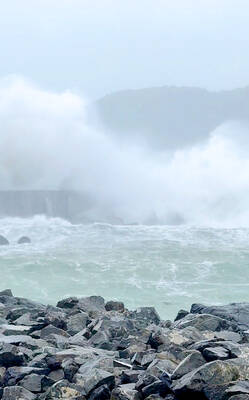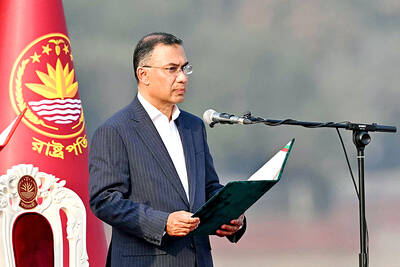The world’s first commercial service offering carbon storage off Norway’s coast has carried out its inaugural carbon dioxide injection into the North Sea seabed, the Northern Lights consortium operating the site said yesterday.
Northern Lights, led by oil giants Equinor, Shell and TotalEnergies, involves transporting and burying carbon captured at smokestacks across Europe.
The aim is to prevent the emissions from being released into the atmosphere, and thereby help halt climate change.
“We now injected and stored the very first CO2 safely in the reservoir,” Northern Lights’ managing director Tim Heijn said in a statement.
“Our ships, facilities and wells are now in operation,” he said.
In concrete terms, after the carbon dioxide is captured, it is liquified and transported by ship to the Oygarden terminal near Bergen on Norway’s western coast.
It is then transferred into large tanks before being injected through a 110km pipeline into the seabed, at a depth of about 2.6km, for permanent storage.
Carbon capture and storage (CCS) technology has been listed as a climate tool by the UN’s Intergovernmental Panel on Climate Change and the International Energy Agency, especially for reducing the carbon footprint of industries like cement and steel that are difficult to decarbonize.
The first carbon dioxide injection into the Northern Lights geological reservoir was from Germany’s Heidelberg Materials cement plant in Brevik in southeastern Norway.
However, CCS technology is complex and costly.
Without financial assistance, it is currently more profitable for industries to purchase “pollution permits” on the European carbon market than to pay for capturing, transporting and storing their carbon emissions.
Northern Lights has so far signed just three commercial contracts in Europe.
One is with a Yara ammonia plant in the Netherlands, another with two of Orsted’s biofuel plants in Denmark, and the third with a Stockholm Exergi thermal power plant in Sweden.
Largely financed by the Norwegian state, Northern Lights has an annual carbon dioxide storage capacity of 1.5 million tonnes, which is expected to increase to 5 million tonnes by the end of the decade.

Heavy rain and strong winds yesterday disrupted flights, trains and ferries, forcing the closure of roads across large parts of New Zealand’s North Island, while snapping power links to tens of thousands. Domestic media reported a few flights had resumed operating by afternoon from the airport in Wellington, the capital, although cancelations were still widespread after airport authorities said most morning flights were disrupted. Air New Zealand said it hoped to resume services when conditions ease later yesterday, after it paused operations at Wellington, Napier and Palmerston North airports. Online images showed flooded semi-rural neighborhoods, inundated homes, trees fallen on vehicles and collapsed

‘COST OF DEFECTION’: Duterte’s announcement could be an effort to keep allies in line with the promise of a return to power amid political uncertainty, an analyst said Philippine Vice President Sara Duterte yesterday announced she would run for president of the Southeast Asian nation of 116 million in 2028. Duterte, who is embroiled in a bitter feud with Philippine President Ferdinand Marcos Jr, was impeached last year only to see the country’s Supreme Court throw the case out over procedural issues. Her announcement comes just days before her father, former Philippine president Rodrigo Duterte, begins a pretrial hearing at the International Criminal Court (ICC) in the Netherlands over crimes against humanity allegedly committed as part of a brutal crackdown on drugs. “I offer my life, my strength and my future

NOT YET THERE: While the show was impressive, it failed to demonstrate their ability to move in unstructured environments, such as a factory floor, an expert said Dancing humanoid robots on Monday took center stage during the annual China Media Group’s Spring Festival Gala, China’s most-watched official television broadcast. They lunged and backflipped (landing on their knees), they spun around and jumped. Not one fell over. The display was impressive, but if robots can now dance and perform martial arts, what else can they do? Experts have mixed opinions, with some saying the robots had limitations and that the display should be viewed through a lens of state propaganda. Developed by several Chinese robotics firms, the robots performed a range of intricate stunts, including martial arts, comedy sketches and choreographed

POST-UPRISING: Bangladesh Nationalist Party lawmakers were yesterday expected to formally elect Tarique Rahman as their leader and new head of government Bangladesh’s prime minister-to-be Tarique Rahman and lawmakers were yesterday sworn into parliament, becoming the first elected representatives since a deadly 2024 uprising. Rahman is set to take over from an interim government that has steered the country of 170 million people for 18 months since the autocratic government of Sheikh Hasina was overthrown. The lawmakers, who promised loyalty to Bangladesh, were sworn in by Chief Election Commissioner AMM Nasir Uddin. Bangladesh Nationalist Party (BNP) lawmakers are expected to formally elect Rahman as their leader, with President Mohammed Shahabuddin then to administer the oath of office to the prime minister and his ministers